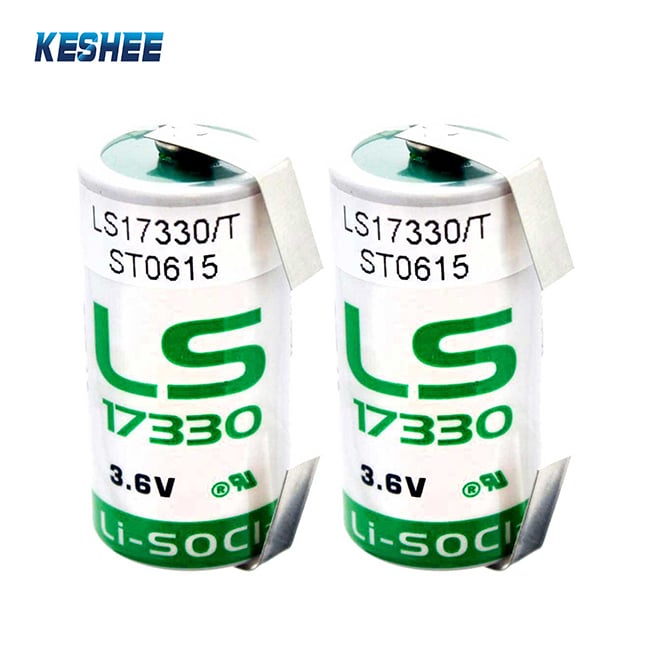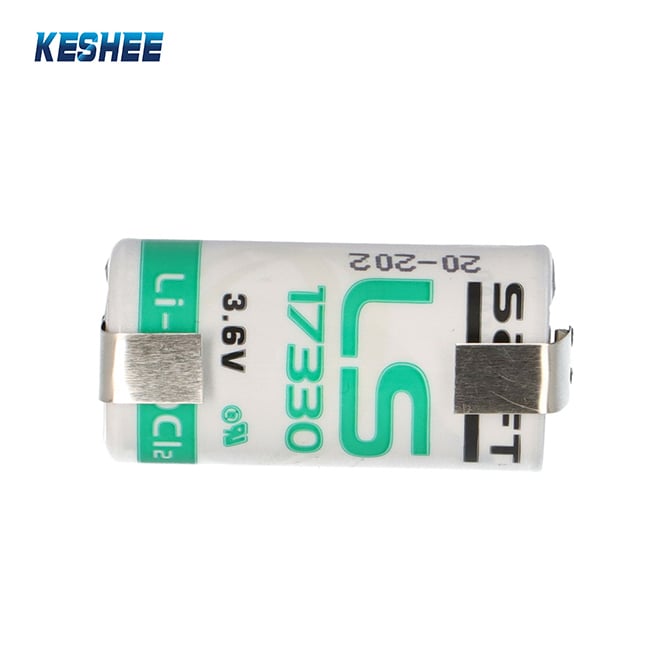Introduction
In the realm of portable power sources, lithium batteries have become synonymous with efficiency, reliability, and longevity. Among them, the lithium primary battery stands out as a key player in providing power to various essential devices. In this article, we will delve into what exactly a lithium primary battery is, explore its wide-ranging applications, clarify its primary status, and highlight the differences between lithium ion and lithium primary batteries as well as why choose Keshee Batteries.
 |
 |
 |
Saft 3.6V 2.1Ah Primary Lithium Battery- LS17330 U Soldering Lug
What is a Lithium Primary Battery?
A lithium primary battery, also known as a non-rechargeable lithium battery, is a type of battery that uses lithium as the anode material and a solid electrolyte. Unlike rechargeable lithium-ion batteries, primary lithium batteries are designed for single-use and cannot be recharged. These batteries excel in delivering a stable voltage throughout their lifespan, making them ideal for devices that require long-lasting power.
Applications of Lithium Primary Battery
The versatility and reliability of lithium primary batteries have led to their widespread adoption in various industries and applications. Some of the notable applications include:
-
Radio Applications: From handheld radios to sophisticated communication systems, lithium primary batteries offer a dependable power source for seamless and uninterrupted communication.
-
GPS (Global Positioning System): In GPS devices used for navigation and tracking, lithium primary batteries ensure consistent and accurate location information.
-
Transmitters: Wireless transmitters, such as remote sensors and data loggers, benefit from the long shelf life and consistent output of lithium primary batteries.
-
Sonobuoy: Sonobuoys used in underwater surveillance rely on the high energy density and stable voltage of lithium primary batteries for extended operation.
-
Telematics: Telematics systems that provide real-time data transmission in vehicles use lithium primary batteries to guarantee reliable performance.
-
Alarm and Security Systems: Fire alarms, burglar alarms, and other security systems are equipped with lithium primary batteries to ensure continuous operation, even during power outages.
-
Electricity Meters: Lithium primary batteries power smart electricity meters, enabling accurate and consistent energy measurements.
Is Lithium Primary Battery a Primary Battery?
Yes, a lithium primary battery is indeed a primary battery. As mentioned earlier, primary batteries are non-rechargeable batteries designed for single-use. Once they have expended their energy, they cannot be recharged and must be replaced with new batteries.
Difference between Lithium Ion and Lithium Primary Battery
The primary distinction between lithium ion and lithium primary batteries lies in their rechargeability and overall use:
-
Rechargeability: Lithium ion batteries are rechargeable, meaning they can be charged and discharged multiple times, whereas lithium primary batteries are non-rechargeable and meant for single-use only.
-
Applications: Lithium ion batteries are commonly used in devices that require frequent charging, such as smartphones, laptops, and other portable electronics. On the other hand, lithium primary batteries find their purpose in essential devices that demand reliable, long-lasting power, as mentioned in the earlier section.
-
Voltage Output: While both types offer stable voltage output, lithium primary batteries are known for maintaining a consistent voltage throughout their lifespan, making them suitable for critical applications that cannot tolerate voltage fluctuations.
Why Keshee is the Right Choice
Whether you're a wholesaler or a retailer, Keshee's 18650 Battery Packs and tailor-made solutions are designed to fulfill all your needs. For wholesalers, the primary concern is the functionality of lithium batteries, and our e-bike lithium batteries are top-of-the-line A-grade products, guaranteeing exceptional performance and safety. These electric bicycle lithium batteries boast high voltage stability, low discharge rates, extended service life, and reliable system stability.
If you are a lithium battery retailer, pricing becomes a crucial factor. At Keshee, our bulk product pricing is surprisingly competitive and more reasonable than our competitors.
As a specialized factory in high-end lithium battery production, Keshee possesses strong customization capabilities and ensures stable delivery times. We have successfully served customers in numerous countries, with an impressive track record of satisfied clients. Our dedicated after-sales support ensures that you can trust the quality of our products, which are all of high standards, and we also accommodate sample requirements. Additionally, we offer ODM and OEM services, catering to all customer customization needs, and we prioritize building stable, long-term relationships with our partners.
Conclusion
The lithium primary battery has proven itself as an invaluable power source for an array of essential devices, offering reliability and longevity that is crucial in critical applications. Its non-rechargeable nature ensures a steady power supply without the need for frequent replacements, making it an ideal choice for devices that require consistent and dependable performance. In contrast, lithium ion batteries cater to devices that necessitate frequent charging and offer flexibility in terms of recharging capabilities. Understanding the differences between these two battery types empowers consumers to make informed decisions when selecting the most suitable power source for their specific needs. As technology continues to evolve, the lithium primary battery will undoubtedly remain at the forefront, powering the future of essential devices with efficiency and excellence.
